Open-source AI tools offer powerful solutions without breaking the bank or sacrificing data control. These tools are changing how businesses innovate. From collaborative AI agents to local language models, this article explores the top 10 AI open source tools that can enhance your operations. Learn how these technologies are making new opportunities available for businesses of all sizes.
What is Open-Source AI?
Open-source AI has become crucial for businesses and developers. Open-source AI refers to machine learning models, frameworks, and tools whose source code is freely available. Anyone can view, modify, and distribute this code. This transparency contrasts with proprietary AI solutions, where the inner workings remain hidden.
The transparency and collaborative nature of open-source AI are its strengths. Developers worldwide can contribute, check the code for bugs or biases, and build more powerful tools. This collective effort often leads to rapid innovation, sometimes faster than proprietary solutions.
For businesses, the appeal goes beyond cost savings. While many open-source tools avoid licensing fees, the real value lies in flexibility and control. Companies can customize these tools to fit their needs, integrate them into existing systems, and scale them as they grow.
Open source doesn't always mean free for any purpose. Some tools come with licenses that may restrict commercial use or require attribution. Also, while the software might be free, businesses need to account for the costs of hosting, maintaining, and possibly customizing these tools.
Difference between open-source and proprietary AI
Comparing open-source and proprietary AI solutions helps clarify their differences. Proprietary AI, often developed by large tech companies, offers polished, ready-to-use solutions with professional support.
These tools usually showcase cutting-edge performance but come with high costs and limited flexibility.
Check out our blog post on the best marketing ChatGPT prompts to see how you can leverage open-source AI for your marketing efforts.
Top Open-Source AI Tools for Innovation
CrewAI: Orchestrating AI Agents
CrewAI stands out as a powerful framework for orchestrating role-playing, autonomous AI agents. This tool enables developers to create AI systems that collaborate to solve complex problems, mimicking human teamwork.
At its core, CrewAI allows for the creation of specialized AI agents, each with distinct roles, expertise, and capabilities. These agents can communicate, delegate, and autonomously collaborate on multi-faceted challenges.
CrewAI excels through its integration with various tools, particularly internet search capabilities, enabling AI agents to gather information and execute tasks accurately. The framework's asynchronous task execution enhances productivity by processing multiple tasks simultaneously.
Businesses can leverage CrewAI across various sectors:
- In finance, AI teams can research companies, analyze market trends, and provide investment recommendations.
- In travel, CrewAI can facilitate trip planning by considering budget, preferences, and logistics.
- Content creators can benefit from AI teams that assist in writing, editing, and compiling newsletters or other materials.
FlowiseAI: Simplifying LLM Application Development
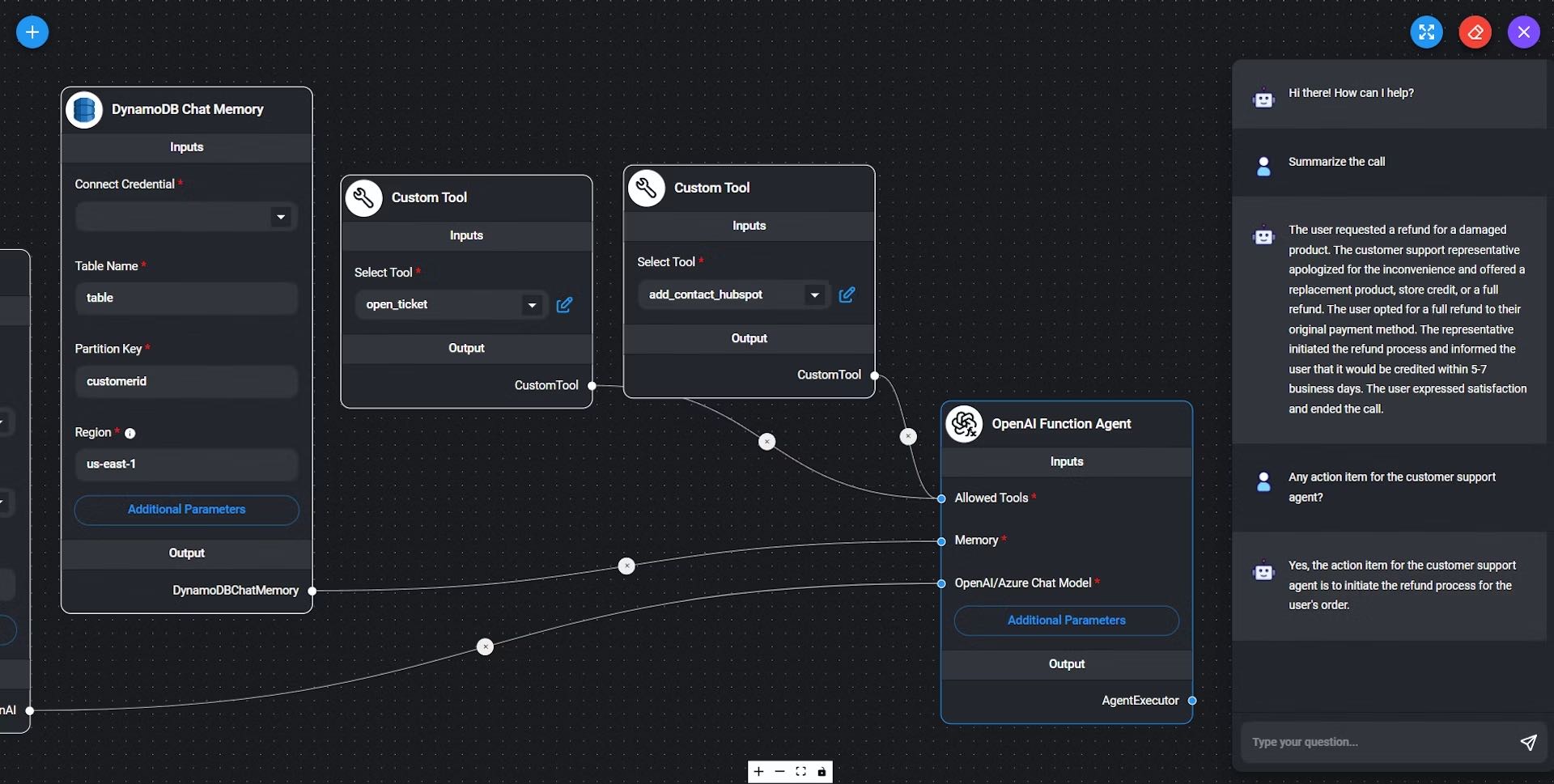
FlowiseAI is a game-changer in large language model (LLM) application development. This open-source, drag-and-drop tool simplifies the creation of customized LLM applications, making advanced AI capabilities more accessible.
The platform's visual programming interface allows users to build LLM flows without extensive coding. Developers can see their flows execute in real-time, streamlining the development process.
FlowiseAI's extensibility is a key strength, enabling integration with popular libraries like LangChain, LlamaIndex, and HuggingFace.
FlowiseAI's versatility shines through its diverse applications:
- Creating question-answering applications.
- Building custom chatbots and QA systems for specific domains or datasets.
- Facilitating web scraping for QnA pairs, automating the extraction of information from websites for LLMs.
- Enhancing data analysis capabilities by developing applications that analyze and interpret large datasets.
- Integrating with platforms like Zapier to automate complex workflows across various business processes.
Vercel AI SDK: Streamlining AI-Powered Development
The Vercel AI SDK is a versatile TypeScript toolkit designed for developing AI-powered applications across multiple frameworks. The unified API offers a consistent interface for generating text, objects, and tool calls across various language models, simplifying integration..
One of the SDK's standout features is its support for multiple AI model providers, including OpenAI, Azure, Anthropic, and others. This flexibility allows developers to switch between or combine different LLMs easily.
The SDK's streaming capabilities enable real-time, dynamic streaming of AI responses, enhancing user experiences. Its edge-ready design ensures seamless operation in edge computing environments, crucial for applications requiring low-latency responses.
Businesses can leverage the Vercel AI SDK for a wide array of applications:
- Developing AI-powered search functionalities to enhance user experience.
- Implementing content generation tools, such as AI-assisted product description writers or blog post generators.
Ollama: Bringing LLMs to Your Local Machine
Ollama allows users to run open-source LLMs directly on their own devices, offering enhanced privacy and control over AI operations.
At its core, Ollama transforms your computer into an AI-powered device, capable of running sophisticated language models offline. It includes a model library featuring popular LLMs like Llama 3, Gemma, and Mistral.
One of Ollama's key strengths lies in its local processing capabilities. Running 100% offline ensures data privacy, crucial for businesses handling sensitive information. The tool also provides an OpenAI-equivalent API at localhost:1337, enabling easy compatibility with other AI applications.
Businesses can leverage Ollama for various use cases:
- Developing private AI assistants that can chat with users without sending data to external servers.
- Using the local API for AI-powered applications, reducing reliance on cloud services and potentially lowering costs.
- Ideal for scenarios with limited or unreliable internet connectivity, thanks to its offline capabilities.
Typebot: Streamlining Conversational Interfaces
Typebot is an open-source tool that empowers businesses to create engaging chatbots and conversational forms without coding. This versatile platform offers a visual builder that makes it easy to design complex conversation flows, integrate with various tools, and deploy across multiple channels.
Key features of Typebot include:
- User-friendly interface: The drag-and-drop builder allows for intuitive creation of conversational flows.
- Customization options: Businesses can tailor the look and feel of their chatbots to match their brand identity.
- Integration capabilities: Typebot connects seamlessly with popular tools like Google Sheets, Zapier, and various CRM systems.
- Multi-platform deployment: Chatbots can be embedded on websites, shared via links, or integrated into messaging platforms.
- Analytics and optimization: Built-in analytics help businesses track performance and refine their conversational strategies.
Typebot's open-source nature means businesses can host it on their own servers, ensuring data privacy and control.

No trial. Generous free plan.
FLUX.1: Advancing Text-to-Image Generation

FLUX.1, developed by Black Forest Labs, is a cutting-edge text-to-image AI model. It offers high-quality outputs and diverse capabilities, making it a valuable tool for businesses in creative industries.
One of FLUX.1's standout features is its superior text rendering ability. Unlike many AI models that struggle with generating legible text within images, FLUX.1 excels.
FLUX.1 isn't limited to just creating new images from text prompts. It also offers image-to-image transformation capabilities, allowing users to modify existing images based on text instructions. This versatility makes it a powerful tool for a wide range of visual content creation tasks.
Businesses in graphic design, digital art, and marketing can leverage FLUX.1 for various applications. It's especially useful for:
- Creating posters, book covers, logos, and other design elements requiring a blend of visual and textual components.
- Generating mockups and concept designs for product visualization, streamlining the product development process.
Typesense: Revolutionizing Search Functionality
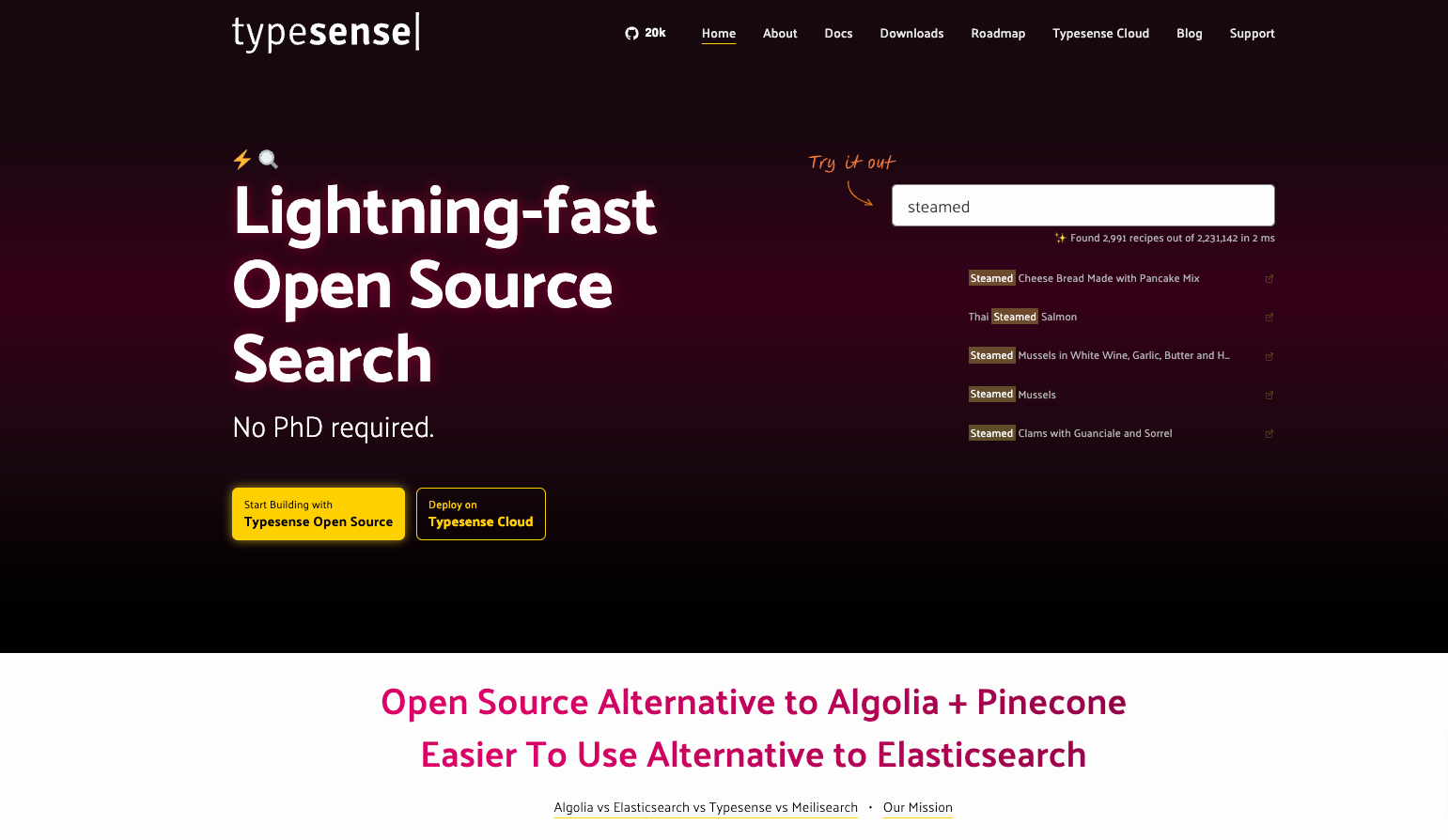
Typesense is a powerful, open-source search engine designed to deliver fast, instant search experiences while prioritizing developer productivity. Its typo-tolerant nature sets it apart, making it an ideal solution for businesses looking to enhance their search capabilities.
At its core, Typesense excels in powering search-as-you-type autocomplete and search results pages with built-in typo tolerance.
One of Typesense's key strengths lies in its geo-search functionality. This feature enables businesses to implement location-based search capabilities, crucial for applications in sectors like real estate, local services, or retail.
Additionally, Typesense offers vector search capabilities, opening up possibilities for similarity-based searches and semantic matching.
Jan.ai: Your Personal AI Powerhouse
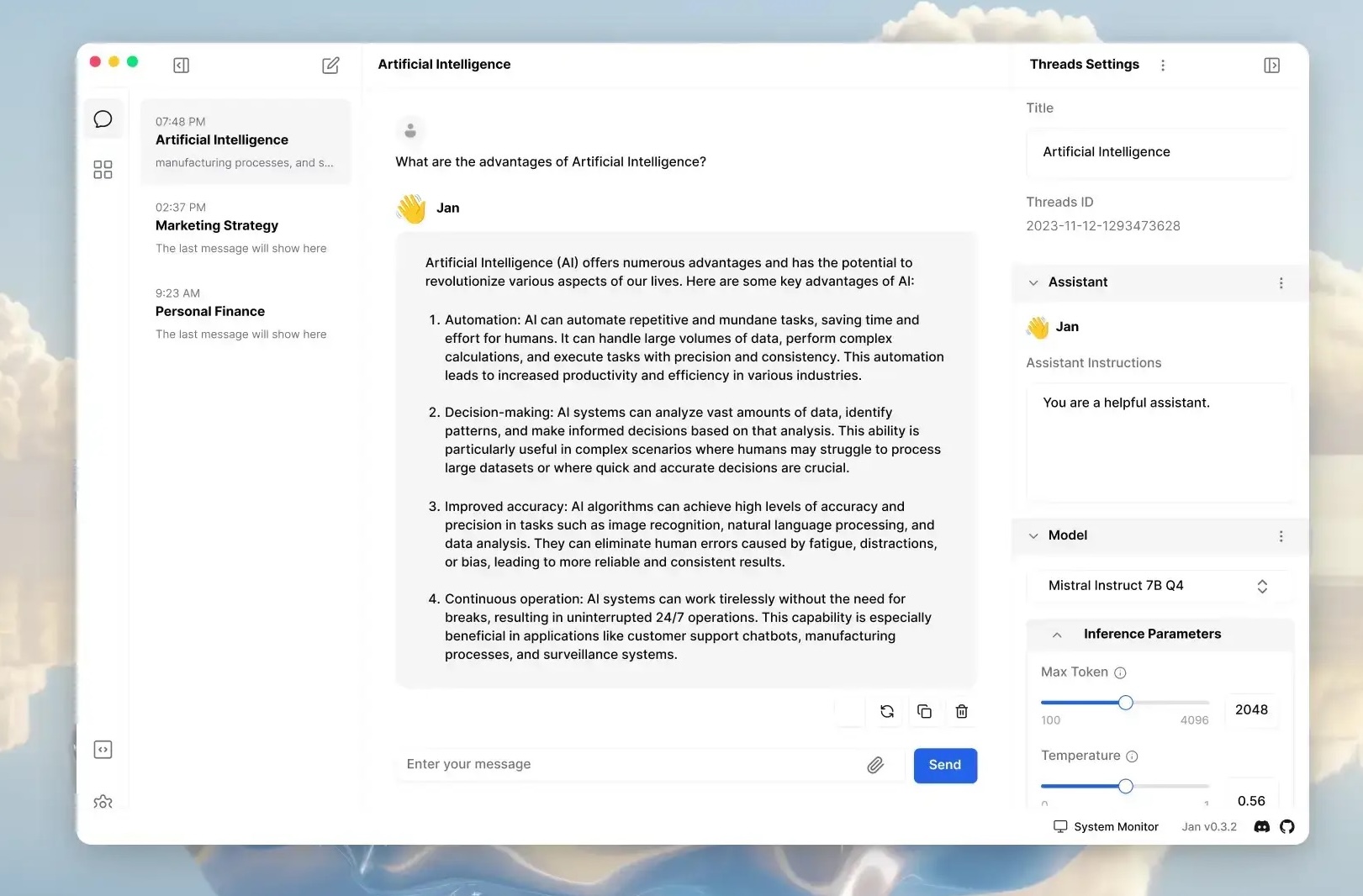
Jan.ai offers a significant step towards democratizing AI technology, providing an open-source, self-hosted alternative to proprietary AI platforms. This tool transforms your computer into an AI-powered device, capable of running large language models locally.
At the heart of Jan.ai is its commitment to privacy and user control. Running 100% offline ensures that all data and processing remain on the user's device, addressing concerns about data privacy and security.
Perplexica: Redefining AI-Powered Search
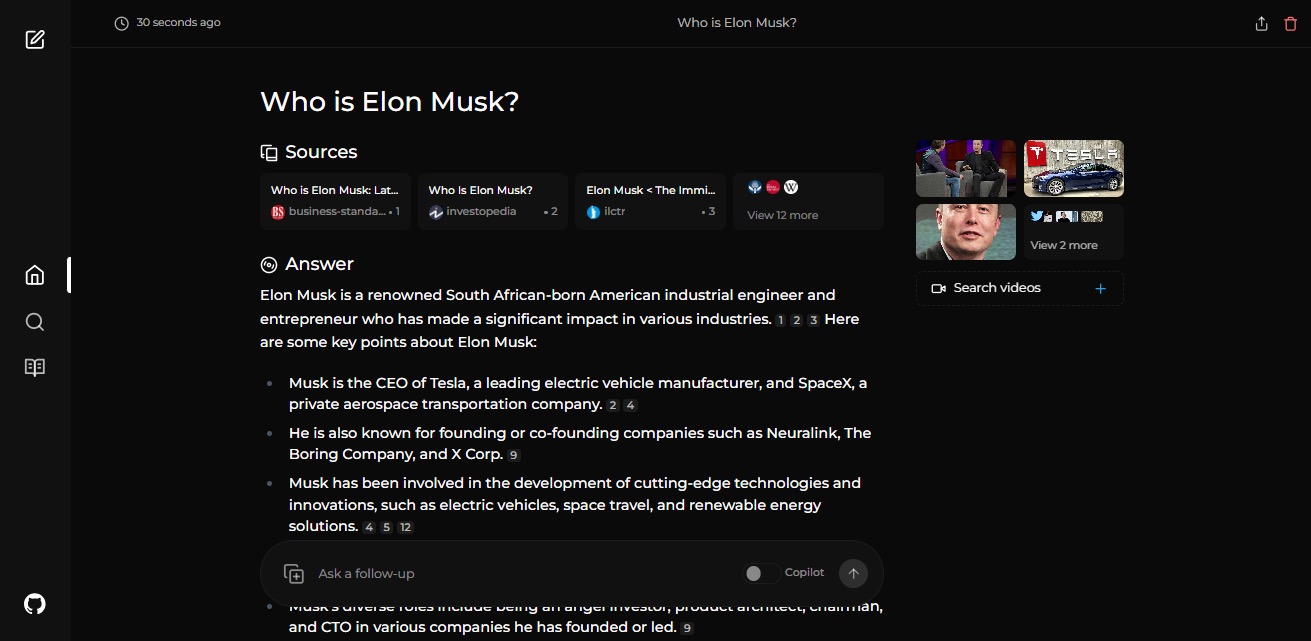
Perplexica is an innovative, open-source AI-powered search engine providing deep and accurate search results. By leveraging advanced machine learning algorithms and large language models, Perplexica offers a refined and privacy-conscious alternative to traditional search engines.
One of Perplexica's key strengths lies in its ability to understand user questions and provide contextually aware results. This goes beyond simple keyword matching, allowing for more nuanced and relevant outcomes.
The engine offers six focus modes, including specialized searches for YouTube, Wolfram Alpha, Reddit, and academic content, as well as a writing assistant mode.
Perplexica's Copilot mode represents a significant advancement in search technology. This feature searches top matches to find relevant web sources, providing users with more comprehensive and accurate results.
OpenAI Whisper: Mastering Speech Recognition
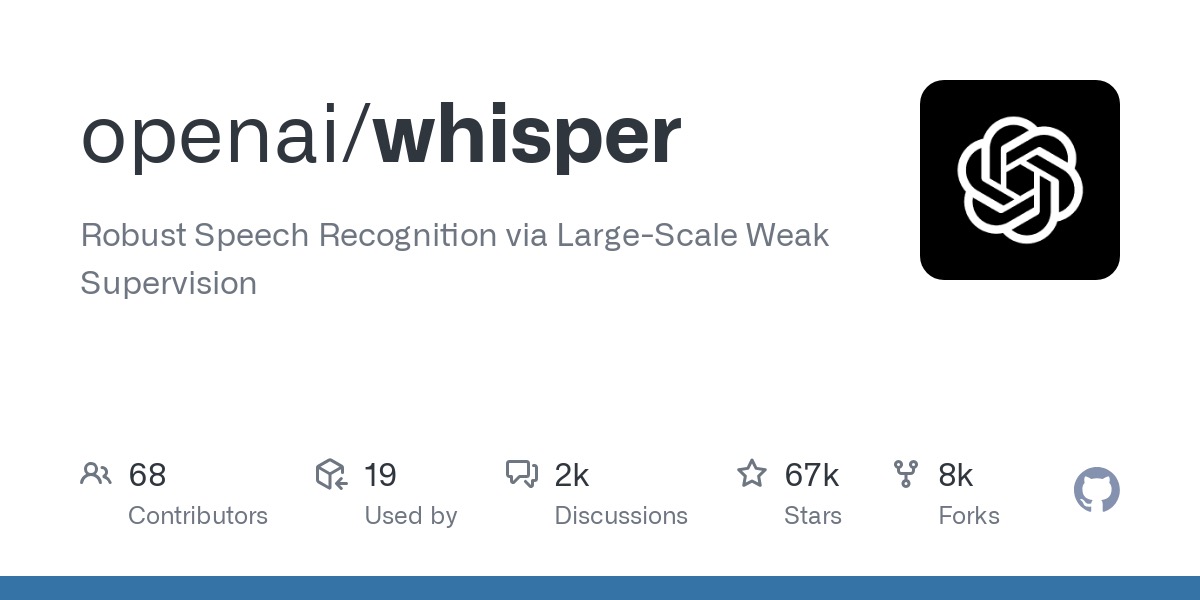
OpenAI Whisper represents a significant advancement in automatic speech recognition (ASR) technology. This deep learning model, based on a Transformer architecture, was trained on 680,000 hours of multilingual, multitask data.
Want to train AIs on your own data? Check our guide
Whisper’s standout feature is its multilingual capability, supporting transcription and translation in nearly 100 languages. This makes it invaluable for businesses operating in global markets or dealing with multilingual content. The model's ability to handle various acoustic conditions and accents further enhances its versatility.
One of Whisper's key strengths lies in its adaptability. While it performs exceptionally well out-of-the-box, it can also be fine-tuned for specific domains or languages, allowing businesses to optimize its performance for their particular needs. The model’s high transcription accuracy across diverse audio datasets makes it reliable for a broad range of applications.
Businesses can leverage OpenAI Whisper for numerous practical applications:
- In content creation, generating accurate subtitles for videos in multiple languages, enhancing accessibility and expanding audience reach.
- In customer service, transcribing and analyzing customer calls in real-time, providing valuable insights for improving service quality.
Scale Your Business with Open-Source AI Tools
Integrating open-source AI tools into your operations can transform your business, offering powerful capabilities at a fraction of the cost of proprietary solutions. However, successful implementation requires a strategic approach and careful planning.
Assess Your Needs and Capabilities
Conduct a thorough assessment of your business needs and current technological capabilities. Identify areas where AI could provide the most significant impact. For instance, improve customer service with OpenAI Whisper, enhance product development with FLUX.1, or streamline data analysis using Perplexica.
Consider your team's technical expertise and available resources for implementation and maintenance. Tools like FlowiseAI offer user-friendly interfaces for team members with limited coding experience. Others, such as CrewAI, may require more advanced programming skills to fully leverage their capabilities.
Invest in Training and Skill Development
The success of your AI initiatives depends on your team's skills and knowledge. Invest in training programs to help staff understand AI fundamentals and the specific open-source tools you're implementing.
Encourage your team to engage with the communities around these tools. Participating in forums and contributing to projects can provide valuable insights and keep your team updated on the latest developments.
Establish a Robust Data Strategy
Many AI tools, including Ollama and Vercel AI SDK, rely on high-quality data to function effectively. Develop a comprehensive data strategy that addresses data collection, storage, preprocessing, and governance. Ensure compliance with relevant regulations and prioritize data security and privacy.
Set up data pipelines that efficiently feed into your AI tools. This might involve:
- Automated data collection processes.
- Establishing data cleaning protocols.
- Integrating data from various sources into a centralized repository.
Monitor Performance and Iterate
Continuously monitor the performance and impact of your AI tools. Establish key performance indicators (KPIs) that align with your business goals. Regularly assess how the AI tools contribute to these metrics.
Be prepared to iterate on your implementations. Gather data and insights to fine-tune models, adjust workflows, or switch to different tools that better suit your evolving needs.
Foster a Culture of Innovation
Encourage experimentation and innovation among your team members. Create an environment where employees feel empowered to propose new ideas for leveraging AI tools and are supported in testing these ideas.
The journey of scaling your business with open-source AI tools is one of continuous learning and adaptation. By carefully selecting and implementing these powerful technologies, businesses can unlock new levels of efficiency, innovation, and competitive advantage.

No trial. Generous free plan.